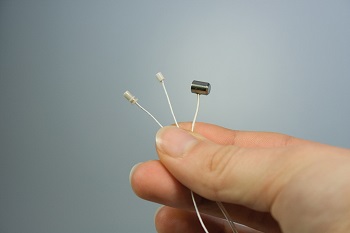A UK-based rail operator has installed eddy current displacement sensors from Micro-Epsilon on both an operational train running in simulated passenger service, and on a test rig built to replicate these conditions.

The sensors measure the radial and lateral displacement of bearing cages relative to the gearbox drive train, withstanding shock loads up to 100g and temperatures up to 70°C.
Following the fatigue failure of plain rolling bearings installed in a passenger train gearbox, the rail operator set up the test rig in order to simulate the measured behaviour of the gearbox bearings under realistic, extremely harsh passenger service conditions.
The test rig comprises an input motor and dynamometer enabling torque to be passed through the drive train and superimposing a torque ripple over the applied torque at rotational speeds up to the equivalent of 100km/h. The gearbox itself is mounted onto an electromagnetic shaker such that a radial vibration can also be applied to the bearing in the gearbox.
Six eddyNCDT 3300 EU-05 eddy current displacement sensors from Micro-Epsilon are mounted in the housing of the plain bearings. Two of these sensors measure the radial displacement of the brass bearing cage. Another two sensors measure the lateral displacement of the cage.
The two remaining sensors measure the displacement of the rollers (cage speed) as they pass the sensors. This allows the rail operator to look at the resonance of the bearing cages under varying loads, as well as how fast the cages are moving relative to the drive train.
As a spokesperson for the rail operator stated: “Our aim is to drive the bearings to destruction, which may take up to 1,000 hours. The test rig has been operating for around 580 hours to date. In this time, the quality of the measurement data coming from the six Micro-Epsilon sensors has been stunning, particularly when you consider the very harsh conditions they need to operate in.
As well as being very oily inside the gearbox, the drive shaft rotates at up to 5,000rpm; shock loads can reach 100g and temperatures as high as 70°C. For that type of environment, you need robust, reliable sensors.”
“The sensors need to measure the displacement of a very small target, i.e. the edge of a bearing cage. In effect, we have a 2mm sensor measuring a 4mm wide target,” explains the customer. “We’ve used Micro-Epsilon sensors prior to this project, including laser displacement sensors and draw wire sensors, both of which had proved extremely reliable.”
According to the rail operator, so far the measurement data has shown that under load, the behaviour of the bearing cages is relatively predictable and stable. However, under certain conditions, bearing slippage occurs, which causes the cages to accelerate rapidly within a short period of time (tenth of a second), which in turn is believed to cause impact between the rollers and the cage.
This causes sufficient stress in the cage to cause fatigue failure to occur and replicates the behaviour of the bearing cage observed during testing conducted on a train operating in simulated passenger service i.e. running like a normal passenger train but with no people on board.
The EU-05 eddy current sensors are unshielded and consist of a sensor and integrated coaxial cable. The measuring range of the sensor is 0.5mm and maximum operating temperature is 150°C.
Micro-Epsilon’s eddyNCDT 3300 range of non-contact eddy current displacement sensors is available with measuring ranges from 0.4mm up to 80mm. Pressure-resistant versions of the sensor are available up to 2,000 bar.
Operating temperatures are from -50°C up to 235°C. An active sensor, controller and cable compensate for temperature fluctuations, offering extreme temperature stability of 0.015%/°C.
Miniature versions of the sensors are used extensively in automotive R&D, where they are used to measure valve stroke, injection needle movement, cylinder head breathing, lubricating gap, oil film thickness, crankshaft concentricity and axial movement of crankshafts.
As well as bearing cage and roller displacement, the eddyNCDT 3300 range of sensors has many other potential uses, such as vibration monitoring of the strip in steelworks, measuring the thickness of foil and in edge control or positioning.
For more information on the eddyNCDT 3300 range of sensors, please call the Micro-Epsilon sales department on 0151 355 6070 or email [email protected]